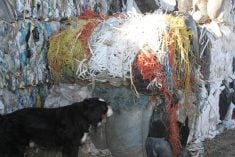BIGGAR, Sask. – A Saskatchewan farmer’s plan to form a global marketing cartel to drive wheat prices higher has moved from neutral into first gear.
“This is the first meeting where we can say the project is being launched. There is no stopping,” Rick Pender told 65 farmers gathered Jan. 4 at the Royal Canadian Legion Hall in this western Saskatchewan town.
In a little more than two months, Pender and his supporters have raised more than the $150,000 minimum required to launch Farm Cor-10-P. Marketing International. Farmers who want to invest in the company must put in a minimum of $500.
Read Also

Message to provincial agriculture ministers: focus on international trade
International trade stakeholders said securing markets in the face of increasing protectionism should be the key priority for Canada’s agriculture ministers.
This marketing agency has some farmers harkening back to another farmer-initiated company created in Saskatchewan in 1924.
“To me, I feel like this is almost the beginning of the wheat pool again,” said Leam Craig, a grain producer who farms south of Biggar.
But Farm Corp is neither a traditional co-operative as Saskatchewan Wheat Pool once was, nor a publicly traded co-op as Sask Pool is today. It’s a private corporation with voting and non-voting shares.
Promoters have sold all 80,000 Class A shares made available to Canadian investors for $2.50 each, and are now selling the $10 Class B shares.
They are reserving 160,000 Class A shares for international investors.
Pender and his family own another 200,000 Class A shares as compensation for coming up with the concept and funding the first stages of the project.
Pender is a farmer and businessperson from Meath Park, Sask. His idea is to create a global wheat-marketing cartel by persuading producers in the five major wheat exporting nations to sign marketing contracts with Farm Cor-10-P. The contracts will be sold later this year.
The first part of the $100 contract gives Farm Cor-10-P. the authority to negotiate higher wheat prices on behalf of farmers with the major grain companies and wheat boards in Canada, the United States, the European Union, Australia and Argentina. The target “floor price” Farm Cor-10-P. will be seeking is $10 per bushel.
If the company fails to negotiate that price, the second part of the contract will be activated.
It calls on contract holders to vote on whether they will hold back a percentage of their wheat inventory for up to 11 months.
Pender’s goal is to get 200,000 to 300,000 farmers in the five major exporting regions to sign these contracts in the next 14 months.
He hopes to contract a minimum of 70 million tonnes of wheat, which represents 25 to 30 percent of production in those five regions. That will give Farm Cor-10-P. the muscle it needs to affect wheat prices.
“There’s a big poker game going on out there and we’re not part of it.”
Some industry analysts say his plan is far-fetched but that didn’t seem to deter farmers at Biggar’s Legion hall last week. Many of them signed up for shares on the spot. Others said they will take out a $100 contract as soon as they become available in March.
“It may or may not be the answer, but it’s a lot better than what we have for power now as individuals,” said Les Anderlik, who farms north of Biggar.
He said Pender’s approach is similar to his own philosophy.
“I already have wheat in the bin stored back because I don’t think it’s worth selling at $2.50 a bushel.”
Gord Houston, who grows wheat and barley north of Herschel, Sask., knew nothing about Farm Cor-10-P. before the meeting, but committed to buying shares and signing a contract by the time the two-hour presentation was over.
“Before, you couldn’t get six guys in a local elevator to think the same way. They all had different opinions about how we should go about making (farming) better. Now there’s a goal in mind to achieve that.”
Even farmers who had some apprehension about the venture decided to invest in Farm Corp..
“You always have a little bit of concern if it’s a private individual or a private group – do they have a hidden agenda?” said Jim Hammond, who operates a grain farm southwest of Biggar.
“Like anything new, you sometimes wonder if you’re using a good dollar to chase a bad dollar or what are you doing. But I guess we’re risky people.”
Mel Elliot farms near Perdue, Sask. He felt the $10 per bu. target price is “pie in the sky” and asked how the inventory holdback would work for farmers who have signed Canadian Wheat Board contracts.
Elliot also expressed some concern about “free-riders,” those farmers who don’t sign contracts but would still benefit from higher prices.
Bob Krueger is an investor and volunteer with Farm Corp.. He hopes that scenario doesn’t unfold.
“The whole thing collapses if everybody is going to be a free-rider,” said the farmer from Borden, Sask.
Krueger said he invested in the company because it offers farmers a chance to control their own destiny instead of relying on government handouts.
The offering memorandum states that farmers must own a minimum of 51 percent of Farm Corp.’s voting shares.
Farmer Terry Johannson said forming a wheat-marketing cartel is a lofty goal, but it makes sense. He mulled over the idea of making the $500 minimum investment in Farm Cor-10-P. while puffing on a cigarette outside the Legion.
“If it works and wheat prices do go up that high and they collect their commission, your dividend in two years is going to pay your $500 back. In a world where you spend $500 to license your damn truck for six months, what’s 500 bucks?”
Johannson is referring to a five-cents-per-bu. commission that Farm Cor-10-P. will charge contract holders if the target price is achieved. But the offering memorandum states the company has no dividend policy. It will only pay a dividend at the discretion of its directors.
Farm Cor-10-P. is expected to begin selling contracts this March and be done in March 2002. Contract holders will then vote on whether they want to participate in the inventory holdback.
The holdback period would start in the United States in June 2002 and continue around the world through March 2003.
The amount to be held back would depend on how many farmers took out contracts. If Farm Corp.’s goal of 70 million tonnes was achieved, the holdback would probably amount to 50 percent of each person’s wheat inventory, said Pender.















